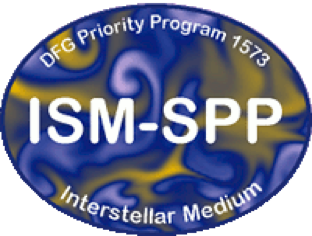
Theoretical Astrophysics group Cologne - TAC
Our research deals with the numerical modelling of the star formation process by means of high-performance, 3D, magneto-hydrodynamical (MHD) simulations. The simulations cover large spatial scales from ISM physics on kpc scales over molecular clouds on scales of 10 - 100 pc to star forming filaments on (sub-) pc scales and finally to protostellar discs and jets on scales of 10 - 1000 AU.
In our research group we use several tools like the (M)HD codes FLASH, GADGET, GANDALF, the astrochemical code KROME, 3D-PDR or radiative transport codes like RADMC-3D and POLARIS.
In the following, we give a detailed overview of the projects


Stellar feedback

Filaments

Protostellar discs and jets

Astrochemistry

Synthetic observations

Code development

ERC
Starting Grant Radfeedback

BSc,
MSc & PhD
This work is supported by
Tools
THE FLASH CODE
3D, Adaptive mesh refinement, magneto-hydrodynamics code (FLASH CENTER for computational science)
GANDALF
SPH code written in C++ (written by David Hubber) Download from github
BTS (BEHIND THE SPECTRUM)
Fully automated multiple-component fitter for optically thin spectra (by Dr. Seamus Clarke) Visit site
SEREN
Gandalf precursor written in Fortran 90 (by David Hubber) Download from github
GADGET
SPH code by Volker Springel. Visit Code website
RADMC-3D
Radiative transfer code for synthetic observations. Visit Code website

